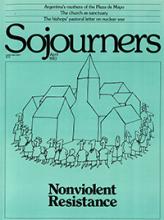Some months ago I received a call from a reporter for one of the nation's largest news magazines. The magazine was doing a cover story on the growing response to the nuclear threat. The reporter posed the following to me: "You know some of the bishops and other church leaders who are now coming out against nuclear weapons. What's in it for them? What political advantage do they hope to gain by coming out at this particular time?"
I shook my head at how little the secular news media understand about the church or about matters of faith. I replied to this cynical reporter, "This may be difficult for you to understand. But what you are observing among the bishops, among leaders of other denominations, and among Christians in local congregations and parishes is a conversion--a conversion to peace. It is a deeply personal movement of faith in the lives of many Christians, who are discovering together that the meaning of their faith is at stake in their response to the threat of nuclear war."
The U.S. Catholic bishops have worked for the last year on a statement that condemns much of U.S. nuclear-weapons policy. Probably the most important thing about the first and second drafts of the pastoral letter on war and peace of the National Conference of Catholic Bishops is the dialogue it is creating in the church.
Because the document is rather long, and ponderous at points, most Catholics will not read much or all of it. But because of the pastoral letter, there is hardly a Catholic in the country who doesn't know that the bishops have made the nuclear question a top priority. And because of that, it has become an item of conversation on the agenda of every Catholic diocese and most every parish.
The letter begins with a call for a new theology of peace and rightly states, "A theology of peace should ground the task of peacemaking solidly in the biblical vision of the kingdom of God."
Read the Full Article

